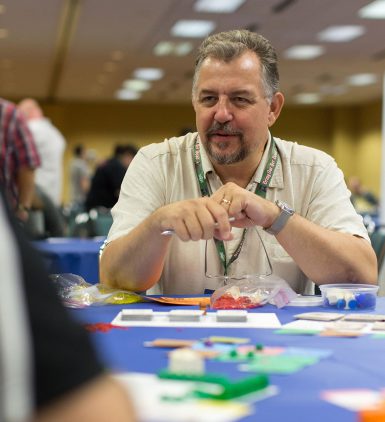Press Release: Sellers debuts new board game at Gen Con
| Contact: | |
| George Vlahakis Senior News and Media Specialist IU Communications 812-855-0846 vlahakis@iu.edu |
Anne Kibbler Director of Communications and Media Relations The Media School 812-855-1705 akibbler@indiana.edu |
By Andrea Zeek, IU Communications
This wasn’t Mike Sellers’ first Gen Con, but it was the first time he presented a new game concept at the Indianapolis convention known as “the best four days in gaming.”

For Sellers, a professor of practice in game design, the experience is equivalent to presenting a paper at an academic conference. Games aren’t just entertainment, he said, they’re a cultural and commercial behemoth with endless possibilities for teaching and learning.
Playing games helps people understand systems, Sellers said. From systems as varied as the human body to a Fortune 500 company to a microchip, games can teach people how different actions – or a lack thereof – can affect their environment over time.
“Understanding systems is as important to this century as literacy was to the last century,” he said.
Sellers, who came to IU in 2014 to help lead the university’s new game design program, has more than 20 years of experience in the gaming industry, including working as lead designer on The Sims 2 and creating Meridian 59, the first 3-D MMO, or massively multiplayer online, game in 1996.
But the game he presented at Gen Con is his first board game – a cheaper alternative to computer games and a more social experience for players.
Sellers’ game, called Our Town, is a town-building game set in early America in which players represent different families trying to gain the most wealth, happiness or influence – collected through life events, revenue from businesses and more. Different family members have different traits that dictate how they react to events in the game such as natural disasters or illness. No one family can win the game alone, though.
“You’re always competing, you all have your own self interest,” he said. “But you have to work together to survive and build your town.”
Our Town players must combine their resources to construct buildings and to help ensure all players have enough to survive because if they don’t, the town will fall apart and all the players lose.
Sellers, who has researched how towns form, said with Our Town he wanted to explore what it means to be part of a community.
“Having the experience of living in a community through a game, people might be able to learn about being a part of a community and apply it to their real life,” he said.
At the end of Our Town, players can look back on their families’ legacies and the town’s history.
That’s why game design is important, Sellers said, because of the bigger lessons people can learn and understand by playing games.
Media School dean James Shanahan said the school’s new bachelor’s degree in game design, offered for the first time this fall, represents an increasingly important part of the media industry.
“Games have rapidly become a dominant force in the development of media,” Shanahan said. “Their popularity and application go beyond what we have come to expect from the typical videogame.”
At IU, he said students would find a challenging program that prepares them for careers in game design and stretches the boundaries of how it’s practiced. Add to that talented faculty such as Sellers, whose creativity and leadership Shanahan said would be a “major component” of the new degree.
Sellers said the major in game design will include a strong foundation in media and game theory as well as a unique three-semester capstone project in which teams of students will design and publish their own games, giving them a good balance of academic and practical knowledge.
For Sellers, who spent years designing Our Town, testing his game at Gen Con has given him even more industry experience and knowledge that he can pass on to students.
“The whole process is really applicable to the classroom because creating a game isn’t easy for anybody,” he said. “It was fun for me because I kind of knew what to expect and hoped it would go well. But it’s also stressful when you have someone looking at your work and saying ‘I don’t like this’ or ‘Do it like this.’”
Overall, Sellers said Gen Con players told him they liked Our Town and would play it again. And he got some new ideas for how to streamline game play and make it quicker and more enjoyable.
“It’s been a big adventure, the whole game design process, as well as going to Gen Con,” Sellers said. “I’m really glad I did it.”

